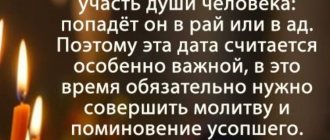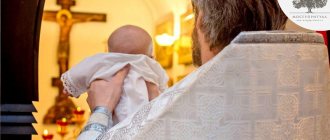"Save me, God!".
Thank you for visiting our website, before you start studying the information, please subscribe to our Orthodox community on Instagram, Lord, Save and Preserve † - https://www.instagram.com/spasi.gospodi/. The community has more than 60,000 subscribers. There are many of us like-minded people and we are growing quickly, we post prayers, sayings of saints, prayer requests, and timely post useful information about holidays and Orthodox events... Subscribe. Guardian Angel to you!
Funerals in the Orthodox religion are among the most stable of rituals and traditions. They are considered to be preparation for the transition of the dying person’s soul to another world. Therefore, it is very important to carry out funeral rituals according to all rules and traditions. In this regard, many Orthodox people wonder whether Orthodox Christians bury on Sunday. Indeed, among modern people there are several opinions on this matter.
What happens to the body and soul 3 days after death. Reasons for a 3-day farewell to the body
Man is body, spirit and soul. When the physical shell dies, life does not end. The soul takes on a new form. It continues to exist without a material component, like an imperishable shell. The body is irretrievably destroyed and gradually disappears. But this is a relatively slow process.
Funeral service for the deceased
After 1 day, the first spots appear due to tissue decomposition, and body temperature decreases. The changes are becoming more obvious. Rigor mortis occurs, and the area of foci of rotting increases. But the appearance of the peritoneum is the first to deteriorate. The face is still recognizable during the first days after the person's death.
This is the first reason why they are buried on the third day - until then, loved ones still have the opportunity to preserve the image of the deceased as he was during life.
The path of the soul is the opposite of the body. If the physical shell returns to dust, the incorporeal component of man goes to God. But for the first three days the soul stays next to the body, visiting familiar places. She is accompanied by angels. It is believed that the incorporeal shell will languish if the burial is carried out before three days. The connection to this day is due to the fact that Christ ascended to Heaven 3 days after death.
The need to hold the funeral on the third day is also due to the fact that at the same time the incorruptible shell appears before the Lord. The Almighty sends her to heaven, but not to stay there, but to get acquainted, so that she can appreciate all the charm and beauty of this monastery. Here the soul stays for 6 days, and then goes to the throne of the Lord again. Now the Almighty sends the incorruptible shell to hell, where it will undergo ordeals and watch over the souls of sinners until the 40th day. And only then is a private trial carried out, which will determine the place of residence of the deceased after death.
The funeral was held on the third day due to the fact that previously people feared dire consequences - they believed in the possibility of burial alive. The reason is a liturgical dream. Moreover, there were already precedents - Francesco Petrarca (woke up 20 hours after his apparent death).
Human soul
On what day is it better to bury the deceased: historical background
They give it to the earth at a certain time and for completely everyday reasons. After stories about the burial of living people, the concept of taphophobia appeared - a panicky fear of ending up in a grave in a cemetery after a person was mistakenly considered dead.
History knows of cases where relatives, due to ignorance, buried loved ones who were in a state of deep fainting or lethargic sleep. Legend has it that the writer N.V. was buried alive. Gogol. The Italian poet Francesco Petrarca fell into a lethargic sleep for 20 hours, and only a miracle allowed his loved ones not to bury him on the day of his death, as was customary to do according to Italian laws of the 14th century. Due to the presence of taphophobia, the German philosopher Arthur Schopenhauer drew up a will in which he asked to count 5 days from the moment of his death and only then give it to the land. In Europe, delaying funerals for three days from the moment of death of a person was introduced by decree of Duke F. of Mecklenburg only at the end of the 18th century.
At the beginning of this century, several “resurrections” of the deceased were recorded, for whom doctors declared death. The error of modern medical workers can be eliminated, incl. observation of the appearance of cadaveric spots on the body of a deceased person on the 3rd day.
When the funeral is postponed. Why can't you bury on Sunday?
It has long been customary to postpone the burial ceremony to any day except Sunday. But few can answer why their ancestors did this. Often the answer to the question whether Orthodox Christians bury on Sunday is positive.
The exception is when a great religious holiday falls on the day on which the burial is scheduled. Moreover, quite often they are actually held on Sunday. This is one of the explanations why they always try to postpone the burial ceremony to Saturday, Monday - any other day. But this must be done if one of the most important holidays for an Orthodox Christian is coming.
Happy Easter
The Feast of the Resurrection of Christ is a special day. Easter symbolizes the resurrection of a person, the rebirth of his soul, the return to the Lord and eternal life. Jesus Christ served as an example. The day when he ascended to heaven has been celebrated by many Christians for more than two thousand years. For this reason, funeral processions are prohibited, clergy do not perform funeral services or conduct burials on Sunday on the Great Holiday - Easter. At the same time, you need to rejoice at what has happened.
A funeral is a sad occasion for meeting relatives, and therefore it is postponed to Monday or another day later.
Happy Easter
Nativity
The birth of a person is a joyful event, but death brings sorrow, even if a believer knows that this is only one of the stages in the transition of an incorruptible shell. But still, the burial changes the usual course of events. It cannot be held at Christmas, because different occasions overlap: they celebrate a great holiday and honor the departed. It is necessary to postpone the burial from Sunday to another day.
Nativity
Week
Easter week is considered a bright holiday. It is not recommended to perform funeral and memorial rites. They should be rescheduled for another day. Most often - after Easter, on Radonitsa - the nearest Tuesday after the Resurrection of Christ. Clergymen occasionally make an exception, but these are special cases when, for various reasons, it is not possible to reschedule the funeral.
Baptism
The holiday of baptism is the third in importance (but not in importance) in Orthodoxy, when burial cannot be held. This is a bright holiday of the baptism of Christ, when it is customary to rejoice. Even if a Christian died on this day or three days earlier, the burial and memorial rites are postponed.
Dormition
No other mourning rites are performed - only in honor of the Most Holy Theotokos, who died. Other services should be postponed, but this is done differently than in other cases, since the holiday lasts several days. Its other name is Theotokos Easter, which is associated with the moment of death, but not forever, but temporarily, until the resurrection of the deceased Mother of God. This means, as during Easter, burial should not take place on the Dormition of the Virgin Mary.
Feast of the Assumption
Funeral ritual for the deceased
A funeral is a sad event for any family and relatives. It is one of the main rituals in Christianity. The ritual of burying the body of a deceased person expresses the parting of people with the deceased. There are several ways to perform this ritual:
- burying the body in the ground,
- committing the deceased to cremation.
History of origin
This ritual is considered important for Christians. The Church considers the conduct of earthly life, during which the body must behave in such a way as to subsequently become incorruptible and immortal. Death is considered only birth into eternity. After death, the body simply falls asleep, and the soul goes to a meeting with the Lord, as well as to a private judgment. And you should carefully prepare for this process. If the preparation of the body for the burial process is carried out with dignity, then by this the believers show their hope for the resurrection of the dead.
Some rites of human burial are in some way very reminiscent of the sacrament of baptism. This is explained by the fact that during baptism a person is reborn from a sinful life for godly and holy service to the Lord, but through death he goes through the process of rebirth for a better, new, eternal life next to Christ.
The first memories of how the burial rite should be carried out are described in the Gospel. It talks about the burial of Jesus Christ. In Orthodox rites there are also some rules that should be followed during preparations for the funeral, as well as during their conduct.
The best article for you, go to: What they bring to church for the funeral table
Features of preparation for burial and the ceremony itself
Before placing the body in the coffin, it must first be washed and then dressed. Only after this the corpse should be placed in a coffin. When choosing clothes, you should adhere to certain recommendations:
- Ordinary people should be buried in civilian clothes, military personnel, firefighters and police officers should be buried in uniform.
- Attire for men should consist of: a classic suit in sober tones, a shirt, underwear, socks, shoes or slippers and a tie (optional).
- Women's clothing: headscarf, dress, underwear, shoes or slippers and tights or stockings. Preference is given to clothing in light colors.
- The clothes of unmarried girls can consist of: a wedding dress, veil, shoes, underwear.
- Many people say that the color red should not be used at funerals. Why can’t people be buried in red clothes and dresses? There is a belief that this color will attract other deaths of the deceased’s loved ones.
- The main requirement for clothing is comfort. Preference is also given to clothing in light colors. It is recommended to use new clothes, but due to the difficult economic situation, you can also use the ones you have already worn. It must be clean, washed and ironed. If there are no suitable clothes in the house where the person died, then under no circumstances should you give yours away, as this may lead to some problems in the future.
Funeral on Sunday: signs and superstitions
There are many customs and traditions associated with the burial ceremony. The main one is that funerals are not held on Sunday, because 3 more deaths may occur after that. It is believed that this is due to a possible violation of God's laws. According to various sources, 3 deaths is not the limit, there may be more. Only those who fear the wrath of the Lord should know that holding a funeral is permissible on any day, unless the date falls on the twelfth holiday, and superstition is a sin.
There are other signs too. Along with the ban on holding funerals on Sundays, the advice not to perform the ceremony on New Year is often mentioned. This means that in the near future we will have to bury someone close to us every month.
It is difficult to say where this belief came from, but today the church allows burials to take place on any day, except religious holidays (if the date of the funeral falls on Trinity, Easter, Christmas, etc.).
Days prohibited for Jewish funerals
Jewish burials take place on the day of death. However, burial cannot be done on Saturday or on holidays. Funerals at night are permitted. In Israel, this is how burials are held at night, as soon as the forbidden Sabbath or holiday date has passed.
Outside this country, taking into account local customs, it is permissible to postpone a Jewish funeral to the second day of the holiday or to the day following death. The burial may also be postponed so that, for example, the son of the deceased has time to arrive from abroad and, as is customary, recite the Kaddish prayer, paying final respects to the deceased in order to preserve his dignity.
Question-answer section
Do Orthodox people have funerals on Sunday?
Expert opinion
Father Pavel
Clergyman
According to Christian traditions, when preparing for a burial, a date is chosen. There is no prohibition on performing the ritual on days off: Saturday, Sunday. Funeral services are also held. But it is important to study the religious calendar to see if there are any important holidays falling during this period. If they are absent, burial can take place. Funerals are allowed on any day except Easter, Christmas, and some other twelve holidays.
Funerals on Sunday are allowed according to Orthodox traditions
Is it possible for Catholics to bury on Sunday or not?
Expert opinion
Remontnikov Vladimir Petrovich
Religious scholar, historian
Catholics do not set boundaries - burial takes place on any day. They are not even tied to a three-day period. You can remember and bury from Monday to Sunday. It is believed that the deceased needs a warm word and support from loved ones at any time. There are no exceptions; from this point of view, Catholics are freer than Orthodox. But this is neither good nor bad, because the opportunity to pay tribute to the Son of God, the Mother of God, during the twelve feasts does not bring harm to the soul, on the contrary, only benefit. By comparison, in Islam it is customary to bury the deceased without delay - on the same day when death occurred. If a Muslim died late at night, then the burial ceremony is postponed to a later date - the next day. The Jews are even more strict when choosing the day of the funeral: the ceremony is not performed on Saturdays and holidays.
Catholic funeral rite
Do they bury people on Sunday in Moscow?
Expert opinion
Gennady Gennadievich Lopyrev
Director of a funeral agency
For Orthodox Christians, there is no connection to a city, region, or country when it comes to the funeral of loved ones. But you should take into account how funeral agencies work in Moscow, St. Petersburg, etc. Many of them do not work on Sundays, which is due to the need to respect the rights of citizens to have a full weekend, but there are also agencies that offer services around the clock, every day without exception (with flexible schedule).
Church funeral on Sunday and evening
According to religious Orthodox canons, the memory of the dead should be honored (buried taking into account customs, traditions, commemoration), and also pay tribute to the Lord and the Saints. It is necessary, first of all, to celebrate great holidays - to honor the memory of the Son of God (they celebrate the Resurrection of the Lord, His Nativity), the Mother of God.
But on other days (during Trinity, Forgiveness Sunday, etc.) it is allowed to perform burial rites and commemorations.
You should further clarify with the clergyman whether this is really the case. To confirm that funerals can be held on Sundays, we need to look at historical facts. It is known that the funeral of St. Tikhon (the last patriarch of the Russian Empire) took place precisely on the last day of the week. It was a memorable date - Palm Sunday.
There is no prohibition on performing burial rites according to the time of day. You can bury loved ones after lunch, which contradicts popular beliefs, according to which it is better not to visit the cemetery after 14:00. The Church does not welcome only midnight burial rites.
Orthodox Church
Features of burial on church holidays
The funeral service on Easter week is carried out according to a special distinctive scenario. During the funeral service, joyful songs are heard, where “Christ is risen!” is repeated repeatedly. According to popular beliefs, those who died on Bright Week are considered righteous who led a sinless life, and therefore will definitely go to heaven. Previously, the dead were placed in the hand of a krashanka, and at the funeral meal there was always Easter cake and painted eggs.
Christmas is the birthday of Jesus Christ, the son of God. It was then that the victory over death happened, a great blessing befell people, because the Savior was born. Funeral services are allowed on Christmas Day, but it is better to ask the priest about the possibility of rescheduling the mournful ceremony. With the permission of the spiritual representative, it is possible to organize a burial later than planned.
Priest's comment
Father Vladimir
Clergyman
Any day is good for performing godly deeds: funerals, wakes, celebrating baptism, birth of a person, etc. This means that you can perform the burial ceremony on Mondays, Fridays, Sundays, etc. Such an action will not be considered a sin, even if it coincides with minor ones religious holidays. It is much more dangerous to openly believe in omens and pagan beliefs. It is not considered a sin to perform rituals that have been preserved since ancient times (pagan), but if they have acquired a different meaning, it is in accordance with Orthodoxy. The ban on funerals on Sundays, as well as drinking alcohol in a cemetery for the purpose of a funeral, is a consequence of false beliefs.
Cost of ritual supplies and transport
| Crematorium/cemetery order | 1 service | 3,300 rubles |
| Ordering transport | 1 service | 1250 rubles |
| Ordering accessories | 1 service | 1250 rubles |
| Ritual accessories | (coffin, bed, pillow, blanket) | 12,350 rubles |
| Hearse bus | route (morgue - crematorium/cemetery) | 15,200 rubles |
| Delivery of supplies to the morgue | 1 service | 3,300 rubles |
| Total: | 36,650 rubles |











